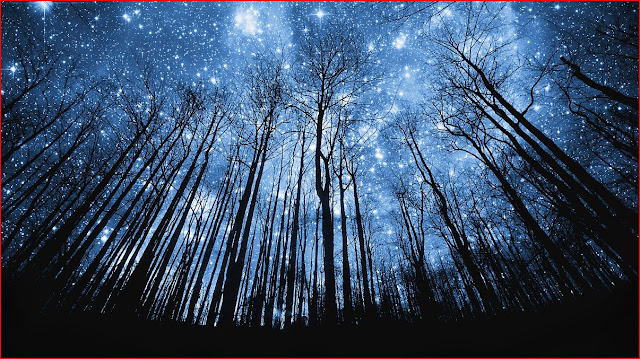School Days
by R.E. Slater
“Walking, I am listening to a deeper way.
Suddenly, all my ancestors are behind me.
Be still, they say. Watch
and listen.
You are the result of the love of
thousands.”
- Linda Hogan (b.1947),
North
American writer
1 Back in my day (somewhere in those middle school years),2 I greased my long blonde hair thick with Vaseline Oil,3 finely combing it, this way or that, in dark, straight lines,4 laying it flat around my head – not like I do now,5 using a rough hair brush and giving it a quick “one-two!” –6 but with a fine-toothed comb like dad’s (we had several),7 just like how mom had taught me when I was young,8 coo'ing in my ear her love and hopes and dreams, making9 me beautiful (as only she could do) in her own special way.10 When finished shaving I'd splash hot aftershave lotion on my face,11 (using the one named Old Spice with the sailing boats on it),12 just like dad did when I watched him in the early waking mornings,13 as we jostled each other for the mirror within our small bathroom –14 him, hurrying to get ready for work (he had too many jobs I thought),15 and me, getting ready for school, in morning's black dark; he’d have16 hot, black coffee perking by the time my brother and I started17 a breakfast of sunnyside eggs (or scrambled), toast and hot cereal,18 as we stuffed paper sacks full (we we’re grown now and didn't use19 tin lunchbuckets holding a fragile glass thermos of hot soup within).20 Then stand in the living room watching for the school bus, but21 briefly glimpsed below our hill from a large picture window that22 looked down upon a five-lane thoroughfare invading our farms,23 listening for the bus’ old screechy brakes – then quickly hurry out –24 racing, slipping, sliding, down the driveway’s black tarred hill,25 hoping it waited for us as we ran, but if it didn’t, well, no matter,26 we’d catch it on t’other side – crossing all five sleepy lanes under27 mom’s worried eye as the bus laboriously turned around, returning28 to the school district it just had left (we had no close neighbors).29 To our secret delight dad drove the school bus when we were younger,30 he was business-like, watching in all directions, while we stepped up31 into the cold dark of the empty bus listening to the blowing heaters32 vainly trying to warm its cavernous chamber; later, dad was promoted33 to day shift, and drove the city police car we rode in (when not on call),34 or rode with him on parade days leading out the volunteer columns;35 and when allowed, we’d ride the red fire trucks dad drove, then cleaned,36 coming home, worn and tired from all-night fires, winter or summer,37 to plow or disc early morning fields, tilling spring grains into dry soils38 for grandpa next door - too old to farm and proud of his warrior son.39 Climbing up, I lugged my saxophone band case - and my brother,40 his trombone case - each of us placing our large instruments upright41 into the hard, green plastic seats like an old friend seated beside us,42 doing our homework, slouched, bouncing along, for the next hour43 (the new school district was a long ways off for us country kids),44 picking up odd-looking kids I maybe would talk to, or ignore,45 (if she was pretty!) wishing I knew how to talk to pretty girls46 and be cool, in my aftershave lotion and finely combed hair,47 dressed-up for school, still adjusting to my new surroundings.48 By now morning light had come as we entered the school campus,49 revealing old-and-new buses dutifully lining-up behind each other,50 disgorging acne-faced kids racing in excited - or shuffling out, bored51 and disinterested under small talk and sighs - crowding into narrow52 hallways alive with the echoes of steel lockers banging shut; there53 saying “hi” to new friends racing to class (buses were always late),54 and answering “Here!” to untested teachers taking daily attendance;55 then methodically writing down spelling words on Friday’s pop quiz,56 held in first hour English under the bright glare of buzzing lights,57 making all nights day and each day the same in their echoing nights.58 Lighting days once wet and young set amidst dewy pastures cloved,59 glistening at the waking dawn hung upon rusted barbed wire strands,60 grasped by a child's willing hands to climb its swaying, rotted fences,61 or squeeze along lifted lines past the studied gazes of pastured bulls,62 harem’d in the foggy mists of fallowing fields holding but lonely paths,63 twining through the empty hollows and thorny brush soaking my64 trouser legs and canvas'd tops of worn Red Ball Jets; ever watching65 great, great grandpa's one-roomed country school looming ahead,66 feeling the dull weight of a lunch bucket in my hand embracing67 youth and sky, sun and field, wind or rain; incarnate fellowships68 to each succeeding day bourne of life and love, pain and unknowing.69 Remembering the many lives of ancient lifetimes lived long ago,70 of grandparents and grandcousins, great uncles and great aunts,71 speak as living legends of forgotten stories unbound in modern books,72 too little to understand an old inheritance’s ancient past dimming, then73 lost, gravestone by gravestone, death by death, breathing last airs, till74 none were left, and all was gone, and none could tell what once was heard,75 in the warming springs of risen dawns, or on red harvest moons hung76 roundish and wise in dusky sublimity over chilled and frosted hillsides,77 silently spelling winter’s coming pall upon all browning fields left dying;78 felt in sunset’s autumn glow and plow, fall hunt and reap; each breathing79 distant lores of muscular shadows held on a school day’s start, enfolding80 like liquid flowing membranes over dis-separate journeys melding close.81 Enfolding being and becoming, entangling each day onto the next,82 melding each life like the falling rain into the pores of open souls,83 blending, slaking, thirsty for the dry grounds of our empty being,84 singularly outpoured, soaking in every experience, and all tales of85 uncharted days indetermined, roaming everywhere and nowhere,86 bending backwards, forwards, forthwards, sidewards, timewards,87 knowing no past but having every past, no future but every future,88 each determining the other binding all present presents as one,89 incarnate fellowships to time and being, to immemorable memory90 of life lived inscrutably on the edges of what was once and now is.
R.E. SlaterApril 13, 2012 (Friday the 13th)revised May 7 (Erica’s BD); Oct 13, 2012;July 13, 2014; Dec 11, 2017@copyright R.E. Slater Publicationsall rights reserved




